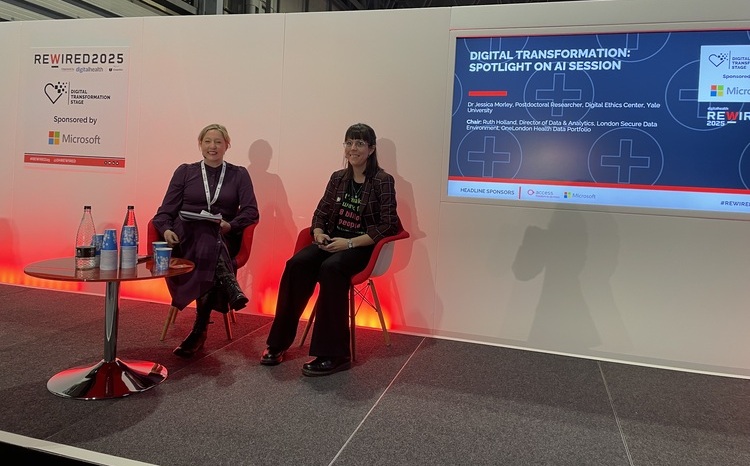Driving healthcare innovation with both patients and the planet at heart
- 27 March 2024

This article is contributed by Stephen McMillan, Solutions Leader for Philips UK & Ireland and Europe.
The NHS Long Term Plan seeks to mainstream digitally-enabled care across all areas of the NHS. Not only will this enable true transformation of healthcare, but it will also play a key role in the delivery of the wider net zero agenda. After all, circular, digital and cloud-based solutions can significantly reduce a hospital’s carbon footprint, while also bringing down costs and increasing efficiency.
But hospitals can’t achieve this transformation alone. Leaders are facing immense pressures, with increased demand for care and the subsequent impact on staff satisfaction. Now more than ever, collaboration between the public and private sector is key to navigate through healthcare’s evolution.
Below, we explain how we can support healthcare leaders – through a unique combination of innovation, design and sustainability – to address some of their most pressing challenges, while also reducing their hospital’s environmental impact.
Transforming healthcare through digitalisation, informatics and AI-enabled solutions
Digital transformation is a top priority for the government and the NHS. But these ambitions aren’t new. There are still challenges to address around infrastructure, interoperability, digital skillsets, and healthcare inequalities. Not to mention scaling innovation in such a complex health system.
But, when equipped with the right solutions, healthcare providers can help to improve patient outcomes, optimise workflows and maximise value across pathways. Hospitals need technologies that can empower frontline staff – using automation and AI to accelerate routine tasks and alleviate pressures.
At Philips we enable fully automated patient and staff-centric flexible workflows, accelerated patient throughput, on-demand communication and education, and aid clinical-decision making, helping to increase productivity and improve efficiency. We’re also innovating cloud-, service- and software-based solutions that make it possible to treat more patients remotely – expanding access to care and reducing the CO2 impact of travelling for appointments.
Supporting NHS net zero with innovative advancements in medical equipment
Building on that, we responsibly embed AI into our propositions and their applications, supporting healthcare providers to perform at their best, feel satisfied in the work that they do, and ultimately help to improve patient outcomes. This can enable greater image quality, faster and at a lower dose.
It’s important as the NHS reports that the non-medicines supply chain, which includes medical equipment, makes up 42% of the NHS Carbon Footprint Plus. Electricity and energy consumption is a natural starting point for many hospitals to look at when assessing their carbon impact and suppliers have a part to play in contributing to that reduction.
We’re supporting this by innovating with advancements in medical equipment across our comprehensive portfolio. Whether it’s for your radiology department, intensive care unit, cardiology, or oncology – many of our products and solutions offer environmental improvements versus the Philips predecessor, in one or more EcoDesign focal areas: energy efficiency, packaging, substances, and circularity.
Delivering maximum value with minimum resources
It’s no secret that the NHS is a stretched resource, with leaders needing to make difficult decisions based on tight capital budgets. That’s why it’s crucial for hospitals to understand how they can extend the usability of their devices.
This could be through software subscriptions and updates, system upgrades, repair initiatives and trade-ins, to help maximise lifetime value and keep them in use for longer. It’s important because sustainability is more than simply purchasing environmentally friendly products. It’s about the carbon footprint of a product over its entire lifecycle. This spans from materials and resources used, to energy consumption, packaging, usage efficiencies, uptime and the end-of-life scenarios.
Digitisation plays a crucial role in this. By increasing efficiency of operations, reducing the need for energy and materials, and enabling remote interactions, you can enhance operational effectiveness but also contribute to a reduction in materials and emissions from travel.
Partnering with NHS Trusts to support net zero goals
As mentioned above, the NHS cannot reach its sustainability goals on its own. A public private sector partnership is crucial, and we have some great examples of how we’re working with customers to help drive forward sustainability initiatives.
For example, our partnership with County Durham and Darlington NHS Foundation Trust has seen us undergo a 360-degree sustainability assessment in its Intensive Care Unit (ICU) to identify opportunities to reduce carbon footprint and material waste. The Trust has reported that this has helped to reduce consumption in the ICU, and improved care through inclusion of sustainability thinking.
We’re now working with other customers to roll-out similar projects, helping them to take a programmatic, phased approach to sustainability – embedding it as an integrated part of their long-term strategy, and a lever for improving business performance.
Sustainable healthcare means the world to us
At Philips, we continue to innovate and scale up our portfolio of energy-efficient, circular, digital and cloud-based solutions. In this way, we can help health systems address their most pressing challenges, including cost of care, staff shortages and growing health disparities, while at the same time reducing their environmental impact.
We believe that, by partnering with care providers, healthcare practitioners, and suppliers, we can scale sustainable practices and help decarbonise healthcare. Thus creating a more resilient and sustainable industry for the generations to come. Get in touch to find out more.





